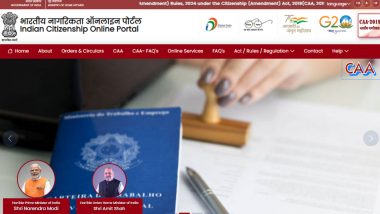New Delhi, March 12: On Monday evening, the Union Home Ministry notified rules for implementation of the Citizenship Amendment Act (CAA), and made online a portal only through which eligible individuals can seek Indian citizenship. The rules grant Indian citizenship to these refugees who had sought shelter in India before December 31, 2014. Here is the link for the web portal: https:/indiancitizenshiponline.nic.in
The CAA, introduced by the Narendra Modi government and passed by Parliament in 2019, aims to provide Indian citizenship to persecuted non-Muslim migrants - including Hindus, Sikhs, Jains, Buddhists, Parsis, and Christians - who migrated from Bangladesh, Pakistan, and Afghanistan and arrived in India before December 31, 2014. The applications for citizenship would have to be submitted in a completely online mode. CAA Rules PDF Download Online: Check List of Regulations for Persecuted Minorities From Pakistan, Bangladesh and Afghanistan to Get Indian Citizenship Under Citizenship Amendment Act.
Following the passage of the CAA by Parliament in December 2019 and its subsequent Presidential assent, significant protests erupted in various parts of the country. The implementation of the CAA, which has been delayed for over four years, necessitated the formulation of its associated rules. As per the manual of parliamentary procedures, the guidelines for any legislation should have been formulated within six months of receiving the presidential assent, or the government should have sought an extension from the Committees on Subordinate Legislation in both the Lok Sabha and Rajya Sabha.
Since 2020, the Ministry of Home Affairs has been regularly seeking extensions from the parliamentary committees to continue the process of framing the rules associated with the legislation. During the past two years, over 30 district magistrates and home secretaries across nine states have been authorized with the ability to confer Indian citizenship to Hindus, Sikhs, Buddhists, Jains, Parsis, and Christians arriving from Afghanistan, Bangladesh, and Pakistan under the Citizenship Act of 1955. CAA Rules Notified: Uttar Pradesh on High Alert, Additional Forces Deployed Amid Implementation of Citizenship Amendment Act.
As per the Ministry of Home Affairs annual report for 2021-22, between April 1, 2021, and December 31, 2021, a cumulative count of 1,414 individuals from non-Muslim minority communities originating from Pakistan, Bangladesh, and Afghanistan were granted Indian citizenship through registration or naturalization under the Citizenship Act, 1955. Under the Citizenship Act of 1955, Indian citizenship by registration or naturalization is granted to non-Muslim minorities from Pakistan, Bangladesh, and Afghanistan in nine states such as Gujarat, Rajasthan, Chhattisgarh, Haryana, Punjab, Madhya Pradesh, Uttar Pradesh, Delhi, and Maharashtra.
It's notable that authorities in districts of Assam and West Bengal, both politically sensitive regions on this matter, have not been empowered with these citizenship-granting authorities thus far. In February, Union Home Minister Amit Shah said in categorical terms that CAA was brought in to provide citizenship and not to take away anyone's citizenship, amidst apprehensions from some quarters that their citizenship status might be altered.
"Minorities in our country, and specially our Muslim community, are being provoked. CAA cannot snatch away anyone's citizenship because there is no provision in the Act. CAA is an act to provide citizenship to refugees who were persecuted in Bangladesh and Pakistan," Shah had said at an event.
(The above story is verified and authored by ANI staff, ANI is South Asia's leading multimedia news agency with over 100 bureaus in India, South Asia and across the globe. ANI brings the latest news on Politics and Current Affairs in India & around the World, Sports, Health, Fitness, Entertainment, & News. The views appearing in the above post do not reflect the opinions of LatestLY)













 Quickly
Quickly


